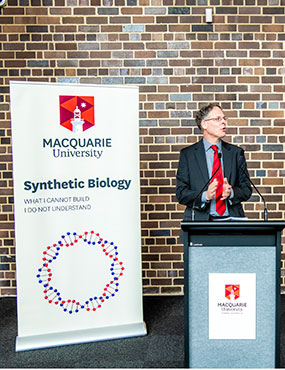Synthetic biology – our success story

The global Yeast 2.0 consortium
The global Yeast 2.0 consortium is on track to produce a Saccharomyces cerevisiae strain with an entirely synthetic, highly versatile genome.
The synthetic strain is the work of a collaboration with nine other institutions including New York University, Tsinghua University, Imperial College, Edinburgh University and the University of Singapore. Macquarie University is responsible for the construction of two chromosomes, synXIV and synXVI. These chromosomes are now fully assembled and are entering the QC and testing phases of the yeast strains produced.
The real utility of this project comes from the SCRaMbLE system, a new-to-nature mechanism for generating genome rearrangements. This system utilises the strategic integration of LoxP sites throughout the synthetic genome for inducible random rearrangement including duplications, deletions and gene inversions. The resulting scrambled population can then be screened for improved phenotypic characteristics.
This technique is currently being employed for the development of superior cellulolytic strains by scrambling-in a variety of cellulase gene expression cassettes. Macquarie is also collaborating closely with the Australian Wine Research Institute to apply Yeast 2.0 knowledge to the wine industry.
Since the inception of Yeast 2.0, Macquarie University has placed strategic importance on this emerging field and has amassed expertise in the design, build, test paradigm of synthetic biology. Macquarie University is now strategically positioned to provide organism engineering services to academia and industry.
Research in the growing Synthetic Biology group has projects centred on the optimisation of microbes as factories, including:
- engineering of synthetic cellular compartments and rewiring the protein secretion pathway
- engineering strains for high-value molecule production and utilisation of alternative carbon sources
- building tools to aid the rapid screening of engineered strains.
For further information, visit Synthetic Biology Consortium website or Centre of Excellence in Synthetic Biology website.